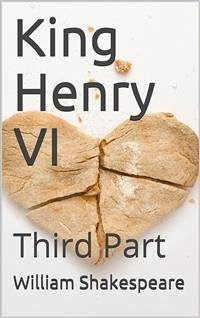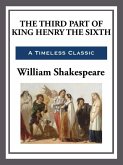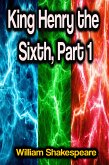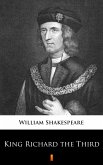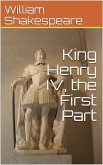Henry VI, Part 3 (often written as 3 Henry VI) is a history play by William Shakespeare believed to have been written in 1591 and set during the lifetime of King Henry VI of England. Whereas 1 Henry VI deals with the loss of England's French territories and the political machinations leading up to the Wars of the Roses and 2 Henry VI focuses on the King's inability to quell the bickering of his nobles, and the inevitability of armed conflict, 3 Henry VI deals primarily with the horrors of that conflict, with the once stable nation thrown into chaos and barbarism as families break down and moral codes are subverted in the pursuit of revenge and power. Although the Henry VI trilogy may not have been written in chronological order, the three plays are often grouped together with Richard III to form a tetralogy covering the entire Wars of the Roses saga, from the death of Henry V in 1422 to the rise to power of Henry VII in 1485. It was the success of this sequence of plays that firmly established Shakespeare's reputation as a playwright. Henry VI, Part 3 features the longest soliloquy in all of Shakespeare (3.2.124-195) and has more battle scenes (four on stage, one reported) than any other of Shakespeare's plays. The play begins where 2 Henry VI left off, with the victorious Yorkists (York, Edward, Richard, Warwick, Montague [i.e. Salisbury] and Norfolk) pursuing Henry and Margaret from the battlefield in the wake of the First Battle of St Albans (1455). Upon reaching the parliamentary chambers in London, York seats himself in the throne, and a confrontation ensues between his supporters and Henry's. Threatened with violence by Warwick, who has brought part of his army with him, the King reaches an agreement with York which will allow him to remain king until his death, at which time the throne will permanently pass to the House of York and its descendants. Disgusted with this decision, which would disinherit the King's son, Prince Edward, the King's supporters, led by his wife, Margaret, abandon him, and Margaret declares war on the Yorkists, supported by Clifford, who is determined to exact revenge for the death of his father at the hands of York during the battle of St Albans. Margaret attacks York's castle at Wakefield, and the Yorkists lose the ensuing battle (1460). During the conflict, Clifford murders York's twelve-year-old son, Rutland. Margaret and Clifford then capture and taunt York himself; forcing him to stand on a molehill, they give him a handkerchief covered with Rutland's blood to wipe his brow, and place a paper crown on his head, before stabbing him to death. After the battle, as Edward and Richard lament York's death, Warwick brings news that his own army has been defeated by Margaret's at the Second Battle of St Albans (1461), and the King has returned to London, where, under pressure from Margaret, he has revoked his agreement with York. However, George Plantagenet, Richard and Edward's brother, has vowed to join their cause, having been encouraged to do so by his sister, the Duchess of Burgundy. Additionally, Warwick has been joined in the conflict by his own younger brother, Montague. The Yorkists regroup, and at the Battle of Towton (1461), Clifford is killed and the Yorkists are victorious. Following the battle, Edward is proclaimed king, George is proclaimed Duke of Clarence and Richard, Duke of Gloucester, although he complains to Edward that this is an ominous dukedom. King Edward and George then leave the court, and Richard reveals to the audience his ambition to rise to power and take the throne from his brother, although as yet he is unsure how to go about it. Read this complete famous novel for further story....
Dieser Download kann aus rechtlichen Gründen nur mit Rechnungsadresse in A, B, BG, CY, CZ, D, DK, EW, E, FIN, F, GR, HR, H, IRL, I, LT, L, LR, M, NL, PL, P, R, S, SLO, SK ausgeliefert werden.

